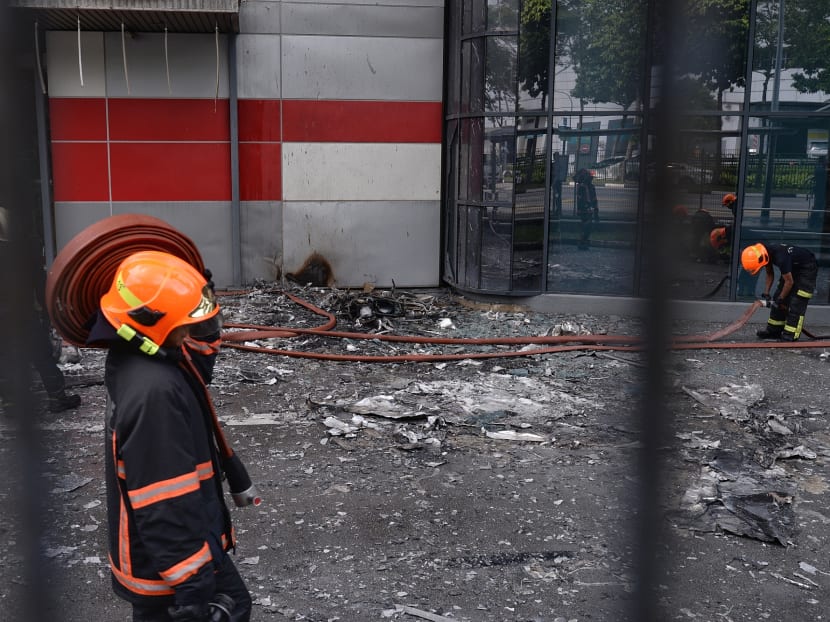Fire at Toh Guan Road building: Cladding supplier, manager face cheating charges
SINGAPORE — Chip Soon Aluminium, the company that supplied composite panels to a building that caught fire last year, has been charged with cheating three customers. Its sales and marketing manager, Benny Phua Chia Ping, faces similar charges.

The scene after a 2017 fire at a building in Toh Guan Road where cladding was installed that had not met fire-safety standards.
SINGAPORE — Chip Soon Aluminium, the company that supplied composite panels to a building that caught fire last year, has been charged with cheating three customers.
There are five charges against the distributor, which is accused of deceiving three companies into paying for Alubond composite panels. It allegedly did so by concealing the fact that the panels’ certificates of conformity — a fire safety requirement — had been terminated.
The offences allegedly occurred in June and July 2013, two to three months after the certificates were terminated on April 5, 2013, court documents stated.
Chip Soon and its sales and marketing manager, Benny Phua Chia Ping, were charged with similar offences in September.
Phua, 40, allegedly abetted the cheating offences. He also faces a sixth charge of acting so rashly as to endanger human life by supplying 259 non-compliant aluminium composite panels in 2014 that were to be installed at CIT Building, located at 30 Toh Guan Road. The building caught fire in May last year, claiming the life of a 54-year-old woman.
Court documents showed that the 259 panels did not comply with any valid certificate of conformity.
Composite panels are used for cladding of exterior walls of buildings.
The Singapore Civil Defence Force (SCDF) filed a police report on July 6 last year based on its findings on the Toh Guan Road fire.
Responding to queries from TODAY on Thursday night (Nov 8), an SCDF spokesperson said: “The case against Chip Soon Aluminium Pte Ltd was first mentioned in court on Sep 25, 2018. As the matter is now before the courts, it is inappropriate to comment further.”
Earlier on Thursday, the SCDF had announced plans to tighten safety regulations and certification processes for building cladding, after composite panels in 60 buildings were found to have failed fire safety requirements last year.
These included the two models of composite panels from the Alubond brand sold by Chip Soon: FRB1, which is certified as Class “0” for use as cladding on external walls; and FRB2, which is certified as Class “1” for roofs and internal walls.
Investigations later found that they did not meet Fire Code standards. The Fire Code here allows only non-combustible panels, or Class “0” on core combustible panels that do not allow flames to spread, to be used on external walls.
SOME 900 PANELS SOLD TO THREE FIRMS
The three companies allegedly deceived by Chip Soon and Phua were HB Glass and Aluminium, Mantec Holdings and Nam Lee Pressed Metal.
About 650 Alubond panels were apparently delivered to HB Glass in June and July 2013, and HB Glass paid more than S$116,000 to Chip Soon.
In July 2013, the distributor delivered 100 panels to Mantec Holdings for about S$23,400, and 147 panels to Nam Lee Pressed Metal for about S$38,700, court documents showed.
The customers were allegedly led to believe that the panels had Class “0” rating.
Chip Soon and Phua will return to court next month.
In the SCDF’s announcement on Thursday, it was said that manufacturers receive a certificate of conformity from certification bodies — valid for five years — when their fire safety products are tested and proven to be fit for use.
The SCDF first announced in August last year that the external walls of 36 buildings here may not have used materials that meet fire safety requirements. Chip Soon had supplied the cladding to 41 buildings.
At the time, Chip Soon had said it was “shocked and dismayed” that its products did not meet fire safety standards and that it had “always believed these products to be fully compliant and properly certified”.
It said it was conducting its own investigations and was demanding a response from the manufacturer of the panels, Eurocon Building Industries FZE in the United Arab Emirates.
Cheating, or the abetment of cheating, carries a maximum punishment of 10 years’ jail and a fine.
If convicted of committing an act so rashly as to endanger human life, Phua could be jailed up to six months and fined up to S$2,500.











